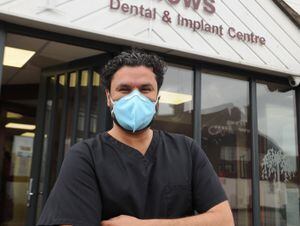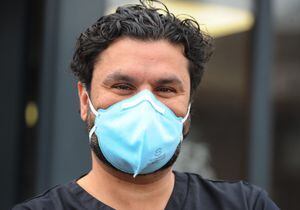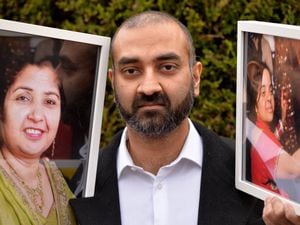Half of adults across Black Country and Staffordshire have not been to dentist in last two years
More than half of adults across the Black Country and Staffordshire have not been to a dentist in the last two years, figures show.

The British Dental Association said access to dental practices has collapsed across England, and warned the impact of the coronavirus pandemic on the nation's oral health will be felt "for years to come".
Figures from NHS Digital show 752,165 people aged 18 and over were seen by a dentist or orthodontist across the region in the two years to the end of December – just 47 per cent of the area's adult population.
This means 53 per cent had not been seen by a dentist within the National Institute for Health and Care Excellence's recommended longest interval between check-ups.
This was up from 47 per cent not seen in the two years to December 31 2019.
Neel Barchha, owner of Willows Dental & Implant Centre in Wombourne, said the figures were "incredibly concerning".
He said: "The pandemic has caused a lot of disruption to dental services, all practices were forced to close in the first lockdown, which left a lot of people without access to dental care.

"The figures are incredibly concerning for the health of our communities. Over lockdown there has been a significant rise in alcohol and tobacco consumption, sugary foods and drinks too, these increase the likelihood of dental disease and more importantly oral cancers.
"The problem is oral cancers spread quickly and even if diagnosed early can leave sufferers disfigured.
"Gum disease can rapidly accelerate without detection, and although it can be stopped the bone can not be regrown once lost. It has also been linked with an increase in severity of Covid symptoms.
Targets
"We are facing a dental public health crisis, and the government imposition of NHS dental targets during the pandemic compromises care. We launched a number of initiatives to get people back out and feeling safe and they seem to working well.
"We are seeing an increase in confidence in people coming back to their dentists, but it still remains the case in the Midlands that those in most real need of care seem to be the least likely to seek it out and receive it.
"At Willow’s dental we have launched a new digital service where if you are concerned about anything in your mouth, you can send us a photo from your phone on Facebook or via email free of charge and we can get a professional opinion on it within 48 hours. Please don’t hesitate to visit your dentist, it may just save your life. "
Across England, just 45 per cent of adults were seen in 2019 and 2020 – the lowest figure since at least 2016 – and down from 50 per cent over 2018 and 2019.
Though dental practices resumed face-to-face care in June, the BDA said the gaps required between patient appointments to prevent coronavirus transmission have "radically reduced" capacity.
It is calling on the Government to invest in mechanical ventilation to help increase patient numbers safely, as has been done in Wales and Northern Ireland.
Eddie Crouch, chairman of the organisation, said: "Access has collapsed, public health programmes suspended, and many practices have been pushed to the brink.
"Serious investment in prevention is needed now, alongside real support for the services millions depend on."
Children
The maximum recommended interval for children is shorter, at just 12 months, and the NHS figures show fewer under-18s are also being seen by dentists than normal.
Across the Black Country and Staffordshire, 28 per cent of youngsters went to the dentist last year.
The BDA warned the impact of sugar-rich lockdown diets, poor access to care and the suspension of public health programmes – many of which are school-run – will come at a "terrible cost" to the most deprived communities.
Mr Crouch said the "shameful inequalities" between the dental health of the rich and the poor will only widen unless the Government intervenes.
NHS figures also show just 3.2 million courses of treatment were delivered across England in the first half of the 2020-21 financial year, compared to 19 million the year before.
Across the area, 117,359 courses of treatment were provided by dental practices between April and September.
Since January 1, the Government has imposed financial targets that will penalise practices if they fail to hit 45 per cent of their pre-pandemic activity targets.
But the BDA has refused to sign up to them, seeing them as unrealistic, and MPs have warned they will force practices to prioritise "volume over need".
An NHS spokesman said strict infection control rules mean many services have been disrupted, but that these targets are fair to dental teams.
He added: “Dentists have been prioritising children’s care and treatment for those patients in urgent need, in part through the rapid establishment of 600 urgent dental centres across England."
A Department of Health and Social care spokesman said the Government was encouraging the food and drink industry to reduce sugar, and will ban TV adverts before 9pm for certain unhealthy foods.
He added: “We are supporting the dental sector and continue to work in lockstep with the NHS to safely increase patient numbers across England."





